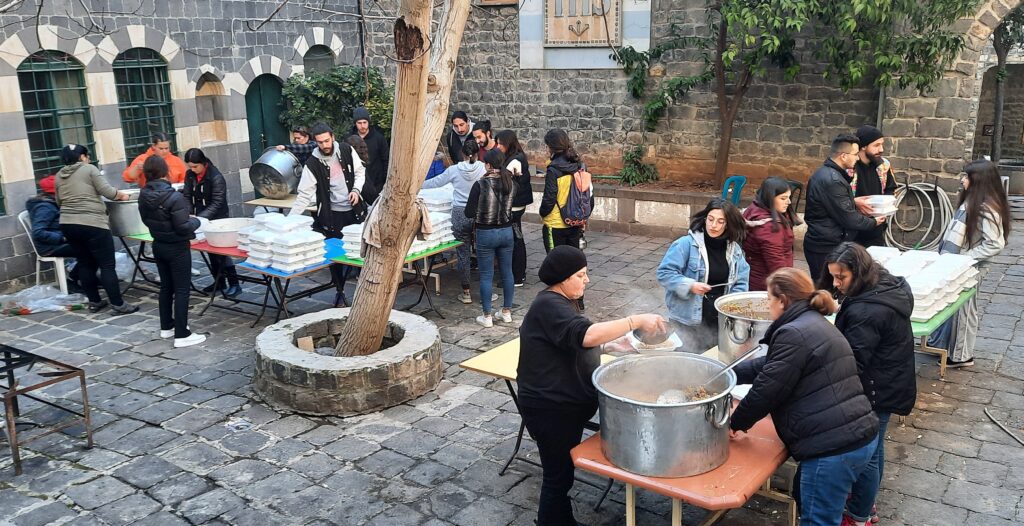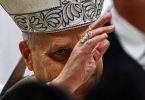
by Doreen Abi Raad
BEIRUT (OSV News) — “My uncle. Please pray for us.” Jesuit Father Tony Homsy received the WhatsApp text message before dawn Feb. 6 from his 14-year-old nephew in Aleppo, Syria.
Sleeping at the Jesuit residence in Beirut, Lebanon, where he was visiting, Father Homsy was not yet aware of the catastrophic 7.8 magnitude earthquake that had struck Turkey and Syria shortly after 4 a.m., severely hitting his native Aleppo.
Within a few days, he returned first to Homs, Syria, where he serves as a parish priest and director of the Jesuit Cultural Center.
While Homs, 115 miles from Aleppo, suffered damage in the catastrophic earthquake — many buildings have already been destroyed and scarred by the 12-year war — “it’s the psychological impact of the disaster that has struck the people,” Father Homsy told OSV News.
“People are reliving again this story of a horrible tragedy,” the priest said. “It’s not only the devastating earthquake, but 12 years of war.”

Father Homsy said he felt that people need to share trauma and express themselves more than before the Feb. 6 tragedy.
“It was like the earthquake had released to the surface all their emotions and fear,” he said. “There are scars from the war still not healed yet.”
Father Homsy’s 14-year-old nephew, whose father was killed by a bomb in Aleppo in 2016, once again faced “the nightmare of death” all around him.
What was especially striking for the young boy was the death of Melkite Father Emad Daher, who had been the youth minister in Aleppo. Father Daher perished in the earthquake rubble when part of the building near the residence of Archbishop Jean-Clement Jeanbart of Aleppo collapsed.
Such sorrow and shock stirred up existential questions from Father Homsy’s nephew, such as, “Why didn’t God stop the earthquake?”
The priest noted that his nephew is representative of the new generation of youth in Syria who have experienced war and now yet another horrific tragedy.
Father Homsy said his parents, who are in their 70s, his widowed sister and nephew were not injured and their home is liveable.
People ran to the churches, he said, noting that “the very first response was there. People remember that the church is a mother that can hold them.”
During a brief visit to Aleppo, Father Homsy visited his childhood parish, the Latin-rite church of St. Francis of Assisi.
In the parish center where he had studied catechism in his youth, families were preparing to sleep. “Every church is a shelter now,” he said.
At the Jesuit monastery In Homs, where Father Homsy serves with five Jesuit priests, people immediately mobilized after the earthquake, volunteering.
Many families, displaced from Aleppo, have sought refuge in Homs, some two hours away from their destroyed homes, despite transportation difficulties amid already-existing fuel shortages.
“I am so touched by the generosity of the people of Homs, considered one of the poorest, most damaged” from the war, Father Homsy said.
The monastery in Homs quickly filled with clothes, mattresses, blankets and food.
“The response of the people is amazing. It’s very moving for me,” the priest said. “Anything they have, they want to share, giving out of their own needs” amid a severe economic crisis, Father Homsy added. Such outreach is happening all over Syria.
“I can see in each one, the widow giving two pennies,” he said referring to the “widow’s mite” (Mk 12:41-44, Le 21:1-4), even though before the earthquake, 90% of Syrians were living below the poverty line.
“One thing we need to make known: Every single family in Syria is suffering in a severe economic situation,” Father Homsy told OSV News.
In Homs, the Jesuit field kitchen is currently preparing daily meals for 700 displaced people who came to the city, mostly from Aleppo, double the amount of meals a few days earlier. And the needs keep increasing.
“The numbers of displaced are getting higher as more buildings are marked as unsafe,” Father Homsy pointed out.
“We cannot blind ourselves to our brothers and sisters who are in need. God’s love will translate by acts of charity and love,” he pointed out.
Young men and women who had hoped or planned to leave Syria — seeing no future on the horizon — are now volunteering, working day and night, to coordinate help in the aftermath of the earthquake.
The tragedy “has reenergized them in a special way. Maybe now they have found some meaning to stay here,” Father Homsy said. “I can read it in their eyes.” Although, he added, “I don’t want to push this.”
“I think the new generation that survived the war and all this catastrophe, if they have the support to bloom again, they can dream of a better future for Syria. We keep praying,” Father Homsy said.
He added that he tells the faithful, “We depend on you, with your gifts that the Holy Spirit gave you.”
To the rest of the world, he says: “We need support. We need prayers,” he said.






